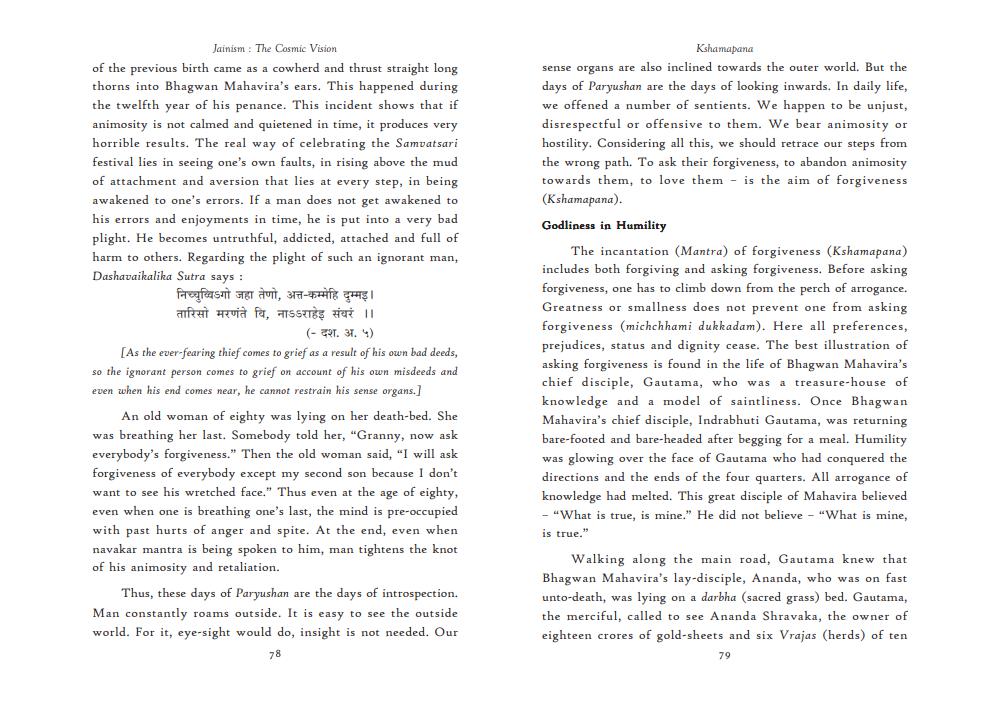________________
Jainism: The Cosmic Vision of the previous birth came as a cowherd and thrust straight long thorns into Bhagwan Mahavira's ears. This happened during the twelfth year of his penance. This incident shows that if animosity is not calmed and quietened in time, it produces very horrible results. The real way of celebrating the Samvatsari festival lies in seeing one's own faults, in rising above the mud of attachment and aversion that lies at every step, in being awakened to one's errors. If a man does not get awakened to his errors and enjoyments in time, he is put into a very bad plight. He becomes untruthful, addicted, attached and full of harm to others. Regarding the plight of such an ignorant man, Dashavaikalika Sutra says:
निच्चुबिगो जहा तेणो, अत्त-कम्मेहि दुम्मड़। तारिसो मरणंते वि, नाऽऽराहेइ संवरं ।।
(- 29. 37. 4) [As the ever-fearing thief comes to grief as a result of his own bad deeds, so the ignorant person comes to grief on account of his own misdeeds and even when his end comes near, he cannot restrain his sense organs.]
An old woman of eighty was lying on her death-bed. She was breathing her last. Somebody told her, "Granny, now ask everybody's forgiveness." Then the old woman said, "I will ask forgiveness of everybody except my second son because I don't want to see his wretched face." Thus even at the age of eighty, even when one is breathing one's last, the mind is pre-occupied with past hurts of anger and spite. At the end, even when navakar mantra is being spoken to him, man tightens the knot of his animosity and retaliation.
Thus, these days of Paryushan are the days of introspection. Man constantly roams outside. It is easy to see the outside world. For it, eye-sight would do, insight is not needed. Our
78
Kshamapana sense organs are also inclined towards the outer world. But the days of Paryushan are the days of looking inwards. In daily life, we offened a number of sentients. We happen to be unjust, disrespectful or offensive to them. We bear animosity or hostility. Considering all this, we should retrace our steps from the wrong path. To ask their forgiveness, to abandon animosity towards them, to love them - is the aim of forgiveness (Kshamapana). Godliness in Humility
The incantation (Mantra) of forgiveness (Kshamapana) includes both forgiving and asking forgiveness. Before asking forgiveness, one has to climb down from the perch of arrogance. Greatness or smallness does not prevent one from asking forgiveness (michchhami dukkadam). Here all preferences, prejudices, status and dignity cease. The best illustration of asking forgiveness is found in the life of Bhagwan Mahavira's chief disciple, Gautama, who was a treasure-house of knowledge and a model of saintliness. Once Bhagwan Mahavira's chief disciple, Indrabhuti Gautama, was returning bare-footed and bare-headed after begging for a meal. Humility was glowing over the face of Gautama who had conquered the directions and the ends of the four quarters. All arrogance of knowledge had melted. This great disciple of Mahavira believed - "What is true, is mine." He did not believe - "What is mine, is true."
Walking along the main road, Gautama knew that Bhagwan Mahavira's lay-disciple, Ananda, who was on fast unto-death, was lying on a darbha (sacred grass) bed. Gautama, the merciful, called to see Ananda Shravaka, the owner of eighteen crores of gold-sheets and six Vrajas (herds) of ten
79




